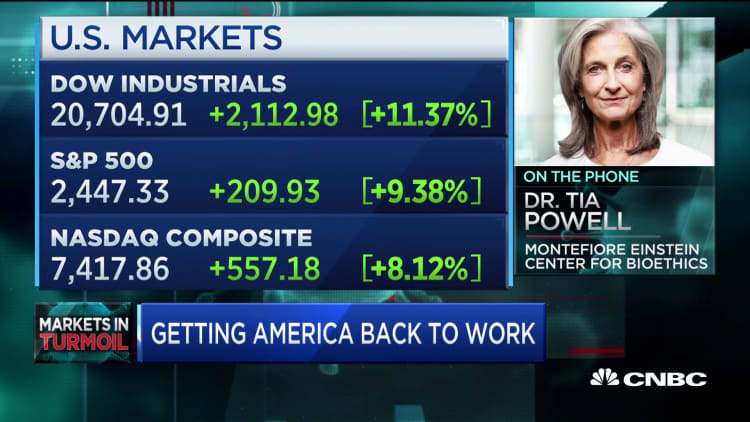
Doctors who specialize in infectious diseases warned Tuesday that deaths in the U.S. from the coronavirus could dramatically increase if the Trump administration relaxes guidelines that have encouraged Americans to minimize contact with one another.
Those doctors said that President Donald Trump, governors and health officials should actually impose even stronger restrictions to stem the spread of the pandemic than are in effect now.
"If you don't keep the restrictions or make them stricter, you're going to have more people infected, hospitalized, and dying from the disease," said Dr. Tina Tan, a board member of the Infectious Diseases Society of America.
"It's going to be a lot more people," said Tan, who works at Lurie Children's Hospital of Chicago.
Trump for days has suggested he would issue new, looser guidelines for social interactions and nonessential businesses, at least in areas that have not seen large numbers of COVID-19 cases.
Trump has been motivated by a desire to reverse at least some of the massive economic fallout from restrictions of varying forms around the country in reaction to the virus outbreak.
Trump said Tuesday, "I would love to have the country opened up, and just raring to go, by Easter," which is on April 12 this year.
Also Tuesday, the number of reported coronavirus cases in the U.S. reached 50,206, with deaths linked to the virus reaching 600.
A day earlier, an article in The Atlantic authored by two doctors called for "a true national pause — a cessation of all nonessential activities" for at least two weeks in the United States, which could significantly slow the progression of the pandemic.

Twenty Democratic members of the House of Representatives in a letter to Trump on Tuesday urged him to "immediately issue a nationwide 'shelter-in-place' order" for at least two weeks for the same reason.
Tan said she agreed that a shutdown of that type could decrease the death toll that is now looming.
"We're going to completely overwhelm the hospital system," without tighter restrictions than those in effect now, Tan said.
"There are many systems right now that are right on the edge. It doesn't take much to push them over."
"Look at Italy," she said, referring to the country that at the moment has the highest number of active coronavirus cases.
"They made some restrictions, then tightened," she said. "Then a lot of people died." More than 6,800 people in Italy have died from the outbreak.
"Loosening restrictions makes absolutely no sense if you look at it from a health perspective," Tan said. "I really think now that people are worth more than actually trying to save the economy right now."
Dr. Greg Poland, a member of the vaccine research group at the Mayo Clinic in Minnesota, said, "This is fundamentally a tension, worldwide, between politics, economics and lives, and how is that going to shake out?"
"That's what I'm worried about," Poland said.
Poland said the rate of transmission of the coronavirus has been increasing exponentially. Like Tan, he said that relaxing guidelines could speed up the number of cases and deaths.
"From a pandemic point of view, the more you keep people distanced from one another, and [practice regular] handwashing, they cannot get infected," he said.
"We haven't even reached the peak of this pandemic yet," he said.
Bringing people back together in business and social settings in coming weeks "means that you are doing that with the full knowledge that you are increasing surge demand on the medical system, and increasing mortality," Poland said.
"As you increase the demand on the health-care system, the mortality rate goes up. It skyrockets," Poland said.
He said tight restrictions that discourage interactions between people should be continued for some time to slow the spread of the virus.
"This is not weeks, this is months, plural," Poland said.
"What we're seeing right now is a reflection of transmissions that happened 14 to 28 days ago," he said. "The reality is you have to have no cases, wait 14 to 28 days, and see if there are no [additional] cases, and then say 'all clear.'"
He compared the pandemic to a house fire.
"If your house is on fire, and I come squirt some water in a corner for a while, yeah, I don't burn that corner, but the rest of the house is on fire," Poland said. "There is no halfway [response], and if there is, the house still burns down."
An analysis by researchers at Imperial College in London projected that 2.2 million Americans could die from the coronavirus without suppression efforts like the ones adopted by states and encouraged by the federal government.
With restrictions, the death toll could drop to 1.1 million, or even less, depending on the strength and prevalence of the restrictions.
Former Food and Drug Administration Commissioner Scott Gottlieb told CNBC's "Squawk Box" on Tuesday that the U.S. has "several more weeks" to go before officials should consider lifting stringent coronavirus mitigation measures such as stay-at-home orders.
"This is going to be a long fight," said Gottlieb, who is a CNBC contributor.
"I think we need to keep this going for several more weeks, but there is an end to this, and we know where it is," Gottlieb said.


